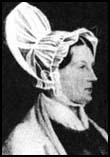Mary Lloyd (abolitionist) facts for kids
Quick facts for kids
Mary Lloyd
|
|
|---|---|
 |
|
| Born | 12 March 1795 Falmouth, England
|
| Died | 25 January 1865 Wood Green, England
|
| Nationality | British |
Mary Lloyd or Mary Hornchurch (born March 12, 1795 – died January 25, 1865) was an important British woman who worked hard to end slavery. She was a key leader in the first Ladies Anti-Slavery Society, which was also known as the Birmingham Ladies Society for the Relief of Negro Slaves. This group played a big part in the fight against slavery in Britain.
Contents
Mary Lloyd's Early Life
Mary Hornchurch was born in Falmouth, England, in 1795. Her family were Quakers, a religious group known for their peaceful beliefs and strong opposition to slavery. Her mother was a minister in the Society of Friends (another name for Quakers), and her father worked as a cooper, making barrels.
Sadly, Mary's mother died when Mary was still a child. Mary then became the main caregiver for her father when he became ill. She looked after him until he passed away in 1818. After her father's death, friends helped care for Mary.
Marriage and Anti-Slavery Work
On November 12, 1823, Mary married Samuel Lloyd (1795–1862). Samuel was very supportive of Mary's efforts to end slavery. In the same year, the Anti-Slavery Society was formed. This group had many famous members, including Mary Lloyd herself, Joseph Sturge, Thomas Clarkson, and William Wilberforce.
Founding the Ladies Anti-Slavery Society
On April 8, 1825, Lucy Townsend started the first Ladies Anti-Slavery Society in Birmingham, West Midlands. Mary Lloyd and Lucy Townsend became the first joint secretaries of this important group. It was first called the Birmingham and West Bromwich Ladies Society for the Relief of Negro Slaves. Later, around 1830, it became known as the Female Society for Birmingham. Other founding members included Elizabeth Heyrick and Sophia Sturge.
By 1831, there were more than seventy similar anti-slavery groups across Britain. Lucy Townsend's organization in Birmingham became a model for other groups, even inspiring similar organizations in the United States.
Continuing Her Work
While in Birmingham, Mary Lloyd also helped start an organization with Lucy Townsend to assist people who were deaf and unable to speak. When Lucy Townsend moved away in 1836, Mary Lloyd continued as the Honorary Secretary of the anti-slavery society. She later became the treasurer in the 1840s. In 1841, Mary became a minister in the Society of Friends, which meant she traveled and spoke about Quaker beliefs and the fight against slavery across England.
For a long time, the work of these women's anti-slavery groups was not fully recognized. However, recent studies show that these groups had a huge impact across the country. They were often more radical than male-led groups and came up with new ways to raise awareness and put pressure on leaders. For example, these organizations encouraged people to stop buying sugar and other products made by enslaved people.
Mary Lloyd passed away in Wood Green in 1865.
Legacy
Mary Lloyd and her husband, Samuel, were buried in the grounds of the Quaker meeting house in Bull Street in Birmingham. Their remains were later moved, but there is a special plaque at the meeting house to remember them and their important work.
 | Bessie Coleman |
 | Spann Watson |
 | Jill E. Brown |
 | Sherman W. White |

